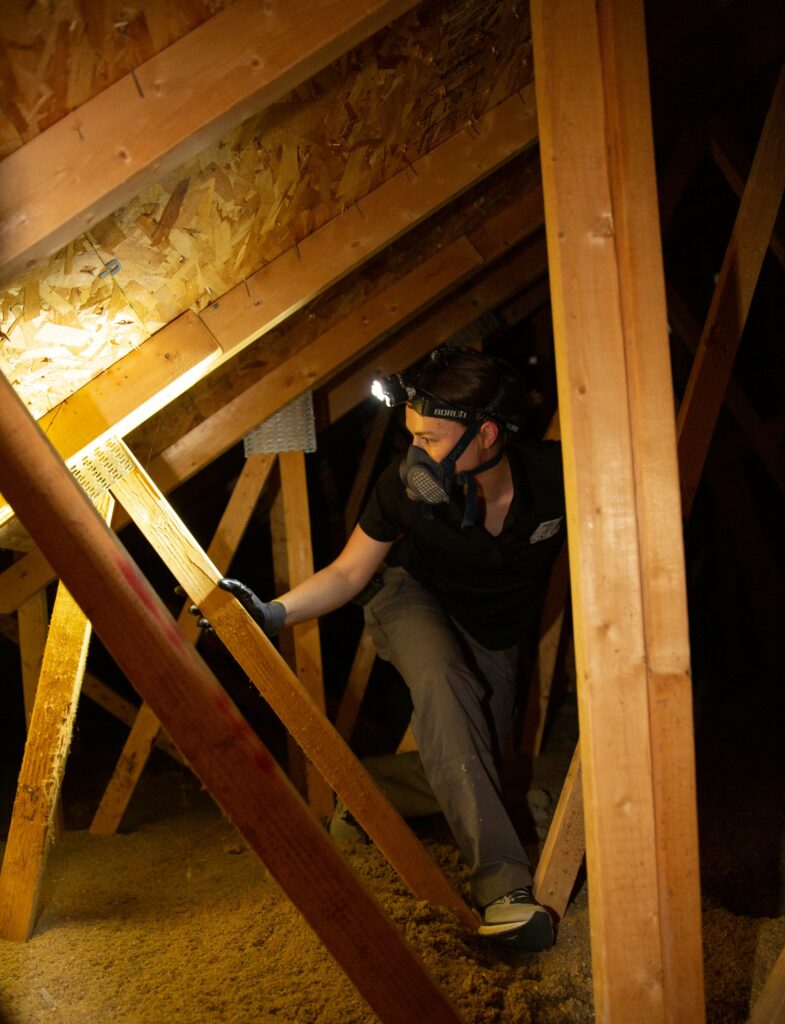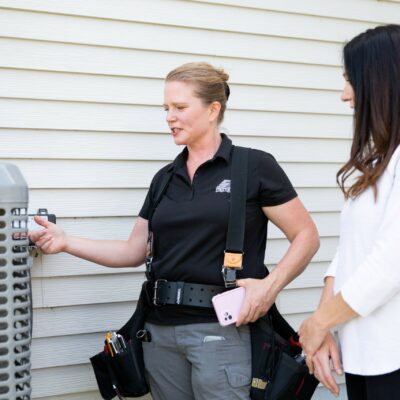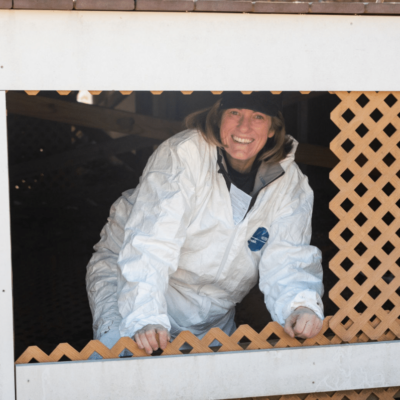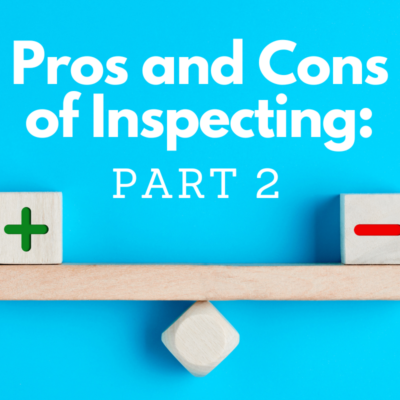Is ‘home inspector’ a good career? Pros and Cons of Being a Home Inspector: Part 1
Last Updated April 4, 2024

In December 2023, American employers faced an interesting predicament: There were 9.5 million job openings, but only 6.5 million unemployed workers, according to the U.S. Chamber of Commerce. With a surplus of employment opportunities for a limited workforce, laborers had their pick of the litter.
Many self-starters and building enthusiasts looking for employment consider a career as a home inspector. By our definition, a home inspector is a trained professional who performs limited, non-invasive examinations of residential and light commercial properties based on standards set by their state or association—like the American Society of Home Inspectors (ASHI). Inspectors produce reports on their findings to help clients make more informed home purchasing and selling decisions.
If you’re contemplating a career as a home inspector, you may be wondering:
- Is being a home inspector a good job?
- What are the pros and cons of being a home inspector?
- What’s the worst part of being a home inspector?
- Is being a home inspector hard?
- Who do home inspectors work for? Do home inspectors work for themselves?
- Can you be a home inspector part-time?
- Is ‘home inspector’ a risky career?
In this two-part series for the ASHI Reporter, we aim to answer these frequently asked questions with the help of a few home inspectors and industry experts. While their experiences and opinions are personal and subjective, they might prove valuable as you weigh this career for yourself.
What are the pros and cons of being a home inspector?
If you want to enter the profession with your eyes open, you must weigh the cons. But there’s plenty to love about a career as a home inspector, too. In fact, you’ll notice many of the cons are a two-sided coin. Depending on your strengths and preferences, some of the disadvantages can also make “home inspector” a good career for you.

Let’s explore some of the pros and cons of being a home inspector.
Con 1: It isn’t remote.
One of the worst parts of being a home inspector, some argue, is the driving. According to FlexJobs’ survey, 95 percent of workers want some form of remote work, whether hybrid or fully remote.
According to Luis Chávez of Top Inspectors in Texas, the disadvantage of not working remotely as a home inspector is exacerbated by unpredictable commutes. When counting how many hours a week home inspectors work, driving can throw a wrench in predictable schedules.
“You don’t pick where the house is, so you’re driving. Sometimes it’s an hour. Sometimes it’s ten minutes away,” Chávez said. “But you can’t work from home.”
Pro 1: Home inspector hours can be flexible.
Remote working aside, you’ll find a lot of autonomy in your career as a home inspector—especially as a self-employed one.
Inspectors can’t get enough of the job’s flexibility. You can break free from the nine-to-five and set your own schedule, planning around other things that matter to you. For example, if you’re a single parent or want to pick up your kids from school or be at soccer games, controlling when you book inspections is a huge perk. Deciding when you want to be available (or not) also makes inspecting a great side hustle.
As a father of four young children, Chávez enjoys prioritizing family time.
“I create my schedule around the family—not the other way around,” he said. “I can wake up with the kids, send them off to school, and drop them off if I need to because my start time is flexible. Then, I try not to schedule my inspections too late so that I’m home for dinner. Eating together as a family is a big thing for us.”
Think flexible hours are only a perk for inspection firm owners? Not so. Many inspection companies, like Thomas Wells’ of Home Sweet Home Inspection Services, LLC in Florida, allow inspector employees to choose their schedules, too.
“Even if they work for a multi-inspector team, a lot of times, they’re still kind of their own boss,” Wells said. “My guys tell us their availability, and we schedule it from there. If they need a day off, that’s up to them. We don’t tell them whether or not they can. They just put it on the calendar.”

Con 2: The success of your career as a home inspector is tied to the real estate market.
If you read our article in January 2024, you know inspectors across the country have reported a 20 to 60 percent decline in inspections since 2020. This article associates the decreased demand with low housing supplies and high home prices.
Wells said having a business that depends on a healthy real estate market can be difficult.
“The majority of our business comes in from people buying homes,” he said. “When the market’s strong, our business is strong. When the market’s weak, our business is weak. It’s frustrating when you have a business that you can’t control.”
To combat the ebb and flow of demand, inspectors like Wells look for opportunities to make more money. This includes services outside a typical buyer’s inspection, like mortgage field services and light commercial building inspections, as well as ancillary services like sewer scope and pest inspections.
Learn more about managing risk during fluctuating home inspector demand here.
Pro 2: You get to see cool homes.
For Wells, the real estate aspect also makes his career as a home inspector entertaining and inspiring. Seeing the good, the bad, and the ugly of varying properties gives Wells ideas for his own home projects.
“You’re in so many different homes—much more so than the normal person. You get a lot of ideas,” Wells said. “I’ll see something and I’ll go, ‘Wow, that’s cool. Maybe we should do that at our house.’”
Con 3: It’s competitive.
No matter what business you’re in, if you own your own company, you’re bound to face competition. Specifically for inspectors, pressure from competition can make it difficult to balance demand with affordable pricing.
Chávez said he’s lost customers for two reasons. Some people have deemed his company too expensive and gone with a more affordable inspector. Others have passed up his business for another that offers more services.
Additionally, competition can affect how inspectors feel about each other. If you’re starting a career as a new home inspector or if you’re new to the area, other inspectors may be reluctant to help.
Chávez said some inspectors can be territorial. But others, like him, are willing to mentor.
“I share my experience with people who want to join. I don’t see them as competition because I think there’s enough work,” he said. “If I can train and mentor someone to do the same quality inspection as me, then some of those inspectors who are not doing a good job get flushed out. It helps the business as a whole.”
Looking for a mentor? Learn about the ASHI Mentorship Program here.
Pro 3: You’ll learn and grow.
As stressful as competition can be, it inspires personal growth and development. This, in turn, makes people happier. According to BetterUp, personal development leads to better self-awareness, self-esteem, resilience, and relationships. And a career as a home inspector is ripe with growth opportunities.
“You’re always learning. Every home is a book, teaching you something,” Wells said.
Continuing to learn also helps you improve your business and manage your risk, said Joe Cook of House Call North Shore in Louisiana in his spotlight interview.
“I don’t think it can be understated how important continuing your education and continuing to learn things can be,” Cook said. “It helps you in your career. It helps you offer a better product, which lessens the amount of problems you have and the number of times you have to get in touch with your insurance provider, which is very important.”
Con 4: It’s physically demanding.

If you’re used to spending your days at a desk, inspecting will be an adjustment. Climbing for roof inspections and inspecting crawlspaces, bearing the snow outside, and braving the heat during an attic inspection all come with being a home inspector.
“When you have to work in the rain or you have to work when it’s 100 degrees out, that’s not fun,” Wells said.
Bad weather, tall heights, and confined spaces aren’t just inconvenient. They’re also hazardous, says Dirk Houglum of D & P Home Inspection in Florida.
“With me falling off a roof, I learned ladder safety very quickly,” Houglum said. “It can be very dangerous.”
And it isn’t just the house’s structure you have to worry about. It’s what’s inside the house, too. Dogs, snakes in a crawlspace or attic, spiders, rats, bats, insects, raccoons, and other pests may all be awaiting you.
Learn more about inspecting safely in these scenarios here.
Pro 4: Every day is different.
Sure, a career as a home inspector comes with challenges. There are some days when being a home inspector is particularly hard. But every day of inspecting is rife with fresh, exciting, new possibilities.
Did you know somewhere between 43 and 53 percent of the workforce is bored right now? If Forbes contributor Curt Steinhorst is right about that, then many employees are feeling unsatisfied and uninterested in their work. Being bored can lead to lots of consequences: less motivation, reduced pleasure, increased depression, and triggered anxiety, to name a few from the National Institutes of Health. That’s why it’s such a pro that inspecting isn’t boring!
For inspectors like Houglum, the variety of houses and situations makes inspecting enjoyable and interesting.
“Every house is different. When I enter a house, I don’t know what I’m walking into, what kinds of nooks and crannies I’m going to find,” Houglum said. “You’re a detective and looking for the crime scenes.”
But what about the actual inspecting? Isn’t going through the same procedures boring? Wells said the fact that the properties and the findings are always different prevents monotony.
“Everything you do every single day, even though it may be repetitive, it’s in a different house. There’s always a different set of circumstances,” he said. “You never quite know what you’re going to run into, and you kind of look forward to that.”
To Be Continued
From the competitive nature to the physical demands, the learning opportunities and the variety, there are lots of variables to weigh when deciding if a home inspector is a good career. Hungry for more? Stay tuned next month as we delve into four more pros and cons of the business.
In the meantime, curious what resources InspectorPro offers new inspectors? Fill out a contact form to get in touch with a member of our team.





